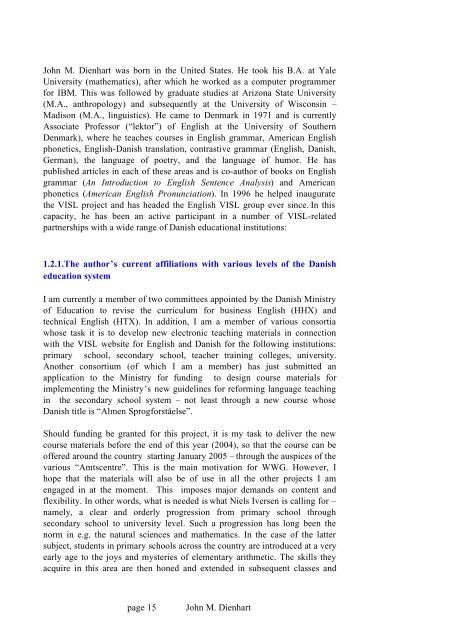Download - VISL
Download - VISL
Download - VISL
You also want an ePaper? Increase the reach of your titles
YUMPU automatically turns print PDFs into web optimized ePapers that Google loves.
John M. Dienhart was born in the United States. He took his B.A. at Yale<br />
University (mathematics), after which he worked as a computer programmer<br />
for IBM. This was followed by graduate studies at Arizona State University<br />
(M.A., anthropology) and subsequently at the University of Wisconsin –<br />
Madison (M.A., linguistics). He came to Denmark in 1971 and is currently<br />
Associate Professor (“lektor”) of English at the University of Southern<br />
Denmark), where he teaches courses in English grammar, American English<br />
phonetics, English-Danish translation, contrastive grammar (English, Danish,<br />
German), the language of poetry, and the language of humor. He has<br />
published articles in each of these areas and is co-author of books on English<br />
grammar (An Introduction to English Sentence Analysis) and American<br />
phonetics (American English Pronunciation). In 1996 he helped inaugurate<br />
the <strong>VISL</strong> project and has headed the English <strong>VISL</strong> group ever since. In this<br />
capacity, he has been an active participant in a number of <strong>VISL</strong>-related<br />
partnerships with a wide range of Danish educational institutions:<br />
1.2.1.The author’s current affiliations with various levels of the Danish<br />
education system<br />
I am currently a member of two committees appointed by the Danish Ministry<br />
of Education to revise the curriculum for business English (HHX) and<br />
technical English (HTX). In addition, I am a member of various consortia<br />
whose task it is to develop new electronic teaching materials in connection<br />
with the <strong>VISL</strong> website for English and Danish for the following institutions:<br />
primary school, secondary school, teacher training colleges, university.<br />
Another consortium (of which I am a member) has just submitted an<br />
application to the Ministry for funding to design course materials for<br />
implementing the Ministry’s new guidelines for reforming language teaching<br />
in the secondary school system – not least through a new course whose<br />
Danish title is “Almen Sprogforståelse”.<br />
Should funding be granted for this project, it is my task to deliver the new<br />
course materials before the end of this year (2004), so that the course can be<br />
offered around the country starting January 2005 – through the auspices of the<br />
various “Amtscentre”. This is the main motivation for WWG. However, I<br />
hope that the materials will also be of use in all the other projects I am<br />
engaged in at the moment. This imposes major demands on content and<br />
flexibility. In other words, what is needed is what Niels Iversen is calling for –<br />
namely, a clear and orderly progression from primary school through<br />
secondary school to university level. Such a progression has long been the<br />
norm in e.g. the natural sciences and mathematics. In the case of the latter<br />
subject, students in primary schools across the country are introduced at a very<br />
early age to the joys and mysteries of elementary arithmetic. The skills they<br />
acquire in this area are then honed and extended in subsequent classes and<br />
page 15<br />
John M. Dienhart
















